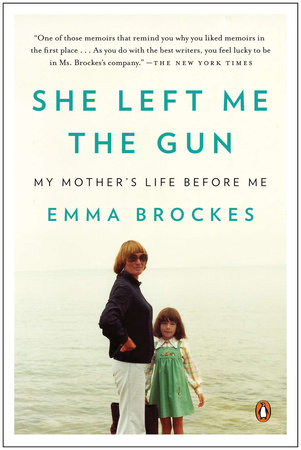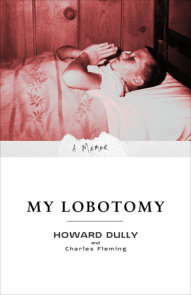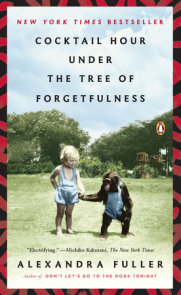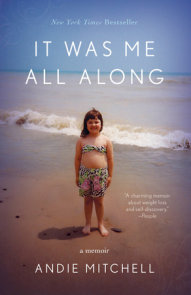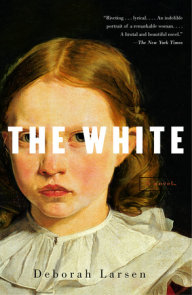READERS GUIDE
Questions and Topics for Discussion
INTRODUCTION
“If the landscape that eventually emerged can be visualized as the bleakest thing I know—a British beach in the winter—she stood around me like a windbreak so that all I saw was colors.” (p. .xv)
Emma Brockes’s childhood was, by any measure, a happy one—an only child doted on by her gentle father and Paula, her beautiful and fiercely devoted mother. Paula’s sharp humor and unsentimental view of life was balanced by anxiety and overprotectiveness that bordered on the absurd, and her life centered on Brockes’s happiness, success, and, most importantly, safety. Yet within this idyllic life were glimmers of a troubled history, with occasional comments that suggested Paula had survived a dark and tumultuous past in South Africa before her move to rural England. The extent of the secret tragedy that defined Paula’s youth is only revealed to Brockes as her mother is dying of cancer: poverty, a violent father, an ugly court case, and her eventual escape to England and a new life. But the truth isn’t always the whole truth and Brockes discovers that even in her dying confession, Paula has protected her daughter from the ugliest details of her secret.
The unearthing of Paula’s past and Brockes’s newfound perspective on her own childhood is at the heart of her latest work, She Left Me The Gun.A story as witty, honest, and brave as the woman it reveals, Brockes’s book is a testament to the strength and resilience of the human spirit and the depths of a mother’s love. Compelled by grief, affection, and curiosity, Brockes travels to South Africa to discover the truth firsthand. Drawing on her experience as a journalist, she resurrects the details of her mother’s childhood through research and interviews with long-lost family members. Alcoholism, violence, and—most disturbing of all—incest were the defining features of Paula’s youth; later, in a brave attempt to protect her youngest siblings, Paula took her father to court, only to have the case collapse in traumatic and damning fashion. Yet, as each sibling shares their own experience of those years, they depict Paula as their emotional anchor and champion, a beacon of light and love in an otherwise tragic life.
By exploring this history, Brockes struggles with the question of whether this work will bring her closer to her mother or if it will destroy what Paula surely saw as the crowning achievement of her life—her daughter’s innocent ignorance of the life Paula had before her. Brockes is amazed, heartbroken, and proud in equal measure about what she learns about her mother and readers will be equally enthralled by this story of a joyful life built upon the ashes of tragedy. Paula is a bold, lively woman of strong opinions and enormous love, and Brockes, as both daughter and journalist, is an excellent guide on this journey through Paula’s life.
ABOUT EMMA BROCKES
Emma Brockes is a writer for The Guardian newspaper and has contributed to Vogue, The New York Times, and Harper’s Bazaar. She has won two British Press Awards as well as the Philip Geddes Memorial Prize for Journalism while a student at Oxford. Her previous book, What Would Barbra Do?: How Musicals Saved My Life,was serialized on the BBC. She currently lives in New York.
A CONVERSATION WITH EMMA BROCKES
1) The South African members of your family are a colorful and compelling group. Are you still in touch with them? Where are they now? What has the experience of the book’s publication been like for them?
I’m in regular touch with my aunt, Fay, and her daughter, Victoria. They’ve been extraordinarily generous about the publication of the book and have decided to embrace it as a good thing, which is no small feat on their parts. My Uncle Tony, too, has been very generous. He dusted off his suit in the hopes we all might get on Oprah.
2) As difficult as it was for you to discover the truth, being a generation removed from the experience provides some emotional safety; your aunts and uncles, on the other hand, were revisiting their own traumatic experiences. How did you get your family—in particular, Fay—to share the details of their youth with you? What concerns, if any, did they have?
Alcohol helped. Not many of these interviews were done in the conventional style, which is to say sitting formally at a table with a voice recorder whirring. During some encounters, I made notes as we spoke, but in most cases, the conversations happened spontaneously. There was no campaign on my part to get my family to speak to me. It was an organic thing that arose naturally from the circumstance of my visiting them in the wake of my mother’s death. My mother’s family understood that I needed to know all these things just to help me deal with the grief and they obliged, even though it involved dredging up horrific memories. From the outset, however, I think they saw the value of these conversations, for themselves as well as for me, and the same went for my writing of the book. They also wanted to honor the memory of their sister and what she had done for them. I think that was a huge, and hugely touching, part of it.
3) In what ways did the discoveries you made about your mother’s past change your view of her, both from the perspective of a daughter and as a woman?
Nothing about my view of her changed at all, which is the most remarkable thing about the whole exercise. I worried at the beginning that I would tarnish or corrupt my memories of her with unpleasant images, or facts I couldn’t reconcile with my understanding of who she had been. But, I realize now, such a thing would only have occurred if my discoveries had shown her up in a bad light; if I had discovered that she had done something dreadful, rather than suffered something dreadful, which is of course not the same thing at all, although in the case of child molestation, the two things are often conflated.
I suppose the only shocking adjustment I had to make was a function of getting older as I wrote the book and realizing that one’s childhood memories don’t lose any power as one leaves one’s twenties and gets into the thirties towards forty. I can summon the sharpest memories from my own, uneventful childhood, which means she could, too, and the thought is impossible to process: that these images were as vivid to her as I was growing up, as my childhood is to me, now. Just extraordinary that she could function in the way she did with all these memories in her head.
4) Considering her strength of will and bravery to endure what she did as well as attempt to bring her father to justice, do you feel that you could you have done what she did?
Yikes, I’ve never given that question any thought. It’s very hard for me to imagine, which is of course a good thing. My suspicion is that under sufficiently pressurized circumstances, I would have large reserves of fanaticism at my disposal. It’s not a part of my nature that has been activated in any meaningful way, but the power of precedent, particularly from one’s parents, is very strong indeed, and so I think if push came to shove, I could do what she did. As I was growing up, my mother would luridly threaten anyone who threatened me, and I’ve always taken it for granted that if one has a child, and that child is victimized, one does what is necessary to eliminate the source of victimization, even if that means being played by Sally Field in a made-for-TV movie called A Mother’s Revenge. (Of course, my mother behaved the way she did without benefit of love, support, or a role model. Her courage came out of a vacuum. An entirely different equation.)
5) Which characteristics have you inherited from your mother?
Her ability to reboot by laughing things off and leaving them behind. A certain unfair impatience with people who can’t do the same. A love of avocados and 1950s musicals.
6) What do you think your mother’s response to the book would be?
She’d be really annoyed by all the things I got wrong. Who in the world wants to read someone else’s interpretation of their life? She would be superficially disapproving of my need to write it at all, which it would’ve been her instinct to perceive as a weakness. Let sleeping dogs lie and all that. But in her heart she’d have known that we killed it. None of this stuff has any power over us any more. She could only have rejoiced at that.
7) Your father is a supportive, albeit secondary, figure in the novel; this is very much a book between you and your mother. How much detail did he know before you began your investigation? How did he respond to the discoveries, and now to the publicity the book has received?
My dad knew the same amount that I did, which is to say, not very much at all. A skeleton outline at most. He was calm and rational and supportive, as he always is, during both the discoveries and the book’s publication. He is a rock, a total rock.
8) On a related note, how did you decide to take a difficult story like this—one that you mention feeling uncomfortable about even discussing with friends—and publish it? How did you convince yourself not only that you wanted to do it, but that you could?
I did it in increments, and at each stage I told myself I didn’t have to go any further if I didn’t want to. So when I researched the book, I thought, well, I don’t ever have to write it. I can just use the distancing mechanism of imagining I might write it to get me through the research period. Then, once I’d done that and was sitting at my desk in New York trying to figure out if I could bear to go back over the notes, I thought, well, I don’t ever have to publish it. I can just write it and put it in a drawer. I kept thinking this right up until the last minute. As for why I wanted to write it in the first place, I can say lots of things about how I wanted it to act as a rebuke to all those terrible, voyeuristic misery memoirs that invite the reader to take a gory delight in other people’s unhappiness, and that was certainly part of it. But the main reason was that it is a terrific story, and I’m a writer. What the hell else is one supposed to do in those circumstances?
9) As a journalist, you have the ability to create a neutral distance between yourself and the stories you write; is this a skill that you relied on during the course of the book? Once the work was finished, did that distance vanish? How did you move beyond the pain of discovery?
The distance never vanished. It’s not just a professional, but also a constitutional consideration. It’s how I am. Maybe the one thing informs the other, but I operate at a distance most of the time any way. (Not in a crazy way). There’s a very good line in an Anne Tyler novel—I forget which one—in which the character is traveling on a bus, trying to absorb a traumatic event while looking at his reflection in the bus window and wondering to himself if (I paraphrase) “there was anything terrible enough that could happen to him in life, that would prevent him from studying his own reaction to it.” I think about that line all the time. It doesn’t denote a lack of involvement, or commitment, or care. It’s simply a way of processing the world.
10) You raise the question of whether in pursuing your mother’s story you are undoing the work she did to separate her childhood from your own. Did you see this as a betrayal?
I worried that it would constitute a betrayal, but it hasn’t, because by integrating those details of her childhood into my life, I have, paradoxically, completely neutralized them. I’m not just saying that to give myself a neat ending: I can say with absolute honesty that while it will pain me to the end of my days to think about these terrible things that happened to my mum, they have zero power over me now. I’m not “haunted”, or ashamed, or frightened, all of which I have been in the past. I’m occasionally furious. But that’s OK. Fury flies outwards, it’s not something you internalize that makes you feel bad.
11) What are you currently working on?
Aaaaaaargh. I’m fulfilling my contractual obligations to The Guardian and trying to get started on another book.
DISCUSSION QUESTIONS
- Should some family secrets remain hidden or is it always healthy to bring the truth to light? Should that decision be left solely to the people directly involved?
- Do you think that Brockes was right to write this memoir? Do you think her mother would have been happy about it?
- How did the writing of this book help Brockes deal with her grief over Paula’s death?
- Paula’s decision to take her father to court in order to protect her siblings was an immensely risky and courageous decision. What is the bravest thing you have ever done?
- While the details are not known, it appears that Paula’s stepmother, Marjorie, recanted or changed her testimony during the second trial, and contributed to Paula’s father’s release. What do you imagine compelled her to do that? Does Marjorie’s behavior make her complicit in abuse of the children?
- Brockes discusses her reluctance to carry a South African passport because of the country’s history of apartheid and its culture of violence. In what ways, if any, did this environment contribute to Paula’s father’s behavior, to her stepmother’s passivity, and/or to the eventual overturning of her father’s conviction?
- Despite the trauma of their childhood, Paula and her siblings have warm memories of each other. Which example did you find most touching?
- Brockes admits that she, like many children, never thought much about her parents’ lives before she was born. Is this true for you? What is the most incredible story you ever learned about your parents?
- Imagine you are talking to your own children, thirty years from now. What would you want them to know about you? What would you want to keep hidden?
- What questions, if any, do you still have about Paula’s life? If you could ask Brockes anything, what would it be?
- Considering what eventually happened to the gun, why did Brockes choose this title for the book?







